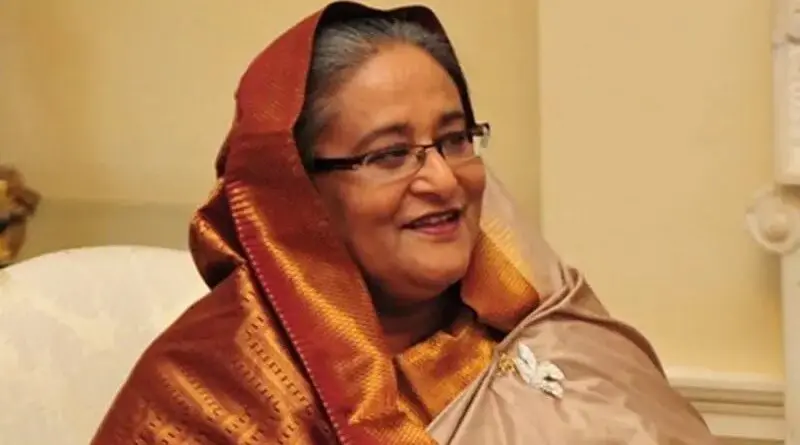Bangladesh PM’s Goa Visit And Delhi-Dhaka Ties – Analysis
By Observer Research Foundation
By Joyeeta Bhattacharjee
Bangladesh Prime Minister Sheikh Hasina paid a two-day visit to India on October 16 and 17 to participate in the BRICS-BIMSTEC outreach meeting in Goa. Foreign Minister A.H. Mahmood Ali, PM’s Principal Secretary Md. Abul Kalam Azad and Foreign Secretary M. Shahidul Haque, among others, accompanied her during the visit. Since the focus of this visit was on the participation in the multilateral summit, attended by ten leaders of the member countries of BRICS and BIMSTEC, the visit did not result in any high profile outcome. However, the visit highlighted the support of her country in India’s fight against terrorism and its willingness to partner in the development at regional or sub-regional level.
BRICS (Brazil, Russia, India, China, South Africa) leaders outreach meeting with BIMSTEC (Bay of Bengal Initiative for Multi-Sectoral Technical and Economic Cooperation) members on the sidelines of the BRICS Summit at Goa, came at a time when the SAARC Summit, which was scheduled in Islamabad in November, has been cancelled after India took the lead in boycotting the event in Islamabad, following increased tension between India and Pakistan after a series of terrorist attacks in Jammu and Kashmir. Bangladesh had also joined the boycott, though for a different reason, along with other regional countries like Nepal, Bhutan and Sri Lanka.
In such a situation, the visit gave her an opportunity to interact with the top leaders of the BIMSTEC countries which include, besides Bangladesh, Bhutan, India, Myanmar, Nepal, Sri Lanka and Thailand. Bangladesh being an important country in the Bay of Bengal region and the host of the BIMSTEC secretariat, her participation was helpful in discussing ways to strengthening cooperation among nations in the region. SAARC, which was formed with the aim of increasing cooperation among regional countries, has failed to make any credible progress in strengthening regional cooperation due to non-cooperation of Pakistan.
Of late, Bangladesh has emerged as a major partner of India and South Asia, especially in pushing connectivity and development. The country was a key partner of India in the formation of the BBIN (Bangladesh, Bhutan, India and Nepal) grouping. Under the BBIN, four countries signed a motor vehicle agreement (MVA) in 2015 after the SAARC MVA could not be formalised following Pakistan’s objection.
In the BRICS-BIMSTEC outreach meeting, Sheikh Hasina supported strongly India’s push for connectivity, emphasising the need for developing quality infrastructure.
Bangladesh has also been supporting India in the fight against terrorism. It was vocal in criticising the terrorist attack in Uri in Kashmir that killed around 18 army personnel in September 2016. Besides, it has been taking action against many anti-India militant and insurgent groups who are active in its soil.
In her speech, Sheikh Hasina expressed her conviction to fight terrorism as she informed that her country maintains zero tolerance for terrorism and the act of violent extremism. She was categorical in her opinion that “all efforts for sustainable development depend on of peace, security and stability.”
During her stay, Sheikh Hasina also had a bilateral meeting with Prime Minister Narendra Modi. The meeting not only displayed warmth and admiration of the two leaders but also gave them an opportunity to discuss bilateral issues. Terrorism and Teesta river water sharing found prominence in the discussion. The two countries seem to recognise terrorism as a common challenge and are keen to learn from each other’s experience. Prime Minister Modi was appreciative of Bangladesh’s ways of tackling the problem of terrorism.
However, there seems to be some disappointment over the lack of progress on Teesta water sharing agreement, which is pending. The agreement was supposed to be signed during former Prime Minister Dr. Manmohan Singh’s visit to Dhaka in 2011 but it could not be inked as West Bengal Chief Minister Mamata Bannerjee raised objections. This meeting gave an opportunity for both the sides to discuss further the issue and resolve it as early as possible.
There was also the significant announcement about a possible bilateral visit by Prime Minister Sheikh Hasina later this year. This announcement is to reduce doubts over the future of the India-Bangladesh relationship in the aftermath of the visit of Chinese President Xi Jinping to Dhaka, just before landing in Goa. During this visit, the Chinese President rolled out a generous economic package that included billions of dollar worth of investments and soft loans of around $24 billion for various infrastructure and developmental projects. The Chinese engagements in Bangladesh have raised concern in India, which is seen as part of their encirclement policy and to woo way Bangladesh, one of India’s closest neighbours.
The views expressed above belong to the author.

